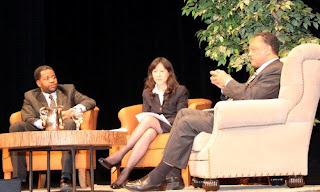Membership is falling in many mainline denominations. In
2011, National Council of Churches reported that there was a decline in church membership
by about 2% in denominations such as the Lutheran, Episcopal, PC (USA), and
Methodist confessions. With this kind of statistic, what is the future of the mainline
denominational church? How can we survive and be meaningful and relevant to a
society where the importance of belonging to a church has been forgotten or
dismissed. Is church membership going to continue to drop because the churches lose
the ability to assist those who have been pushed to the margins of society? What
can we do to help our churches grow and survive?
This past spring semester, the Rev. Jesse Jackson Sr.
visited Lehigh University and Moravian College and participated in two public
lectures called, “A Conversation with Rev. Jesse Jackson” moderated by Dr.
James Braxton Peterson and myself.
The conversations were lively, energetic, and prophetic. At
the end of each session a 30 minute Q&A period followed. A Lehigh University
student asked Rev. Jackson, “What is your greatest achievement and why?” Rev.
Jackson had a smile on his face and swiftly and unexpectedly responded
“surviving,” to which the audience clapped and roared with laughter. After the
audience calmed down, he quickly gave a moving, serious, and more elaborate
answer to this question by telling a story from his childhood about his father
and his brother. The fuller answer to the question was very moving, but it was
the first impulsive, quick, and unanticipated one that caught me off guard and
has stayed with me to ponder.
Reflecting on his answer that ‘surviving’ was his greatest
achievement, it seems astounding when you consider that Rev. Jackson has worked
on and continues to work on his fight for justice and equality. Rev. Jesse
Jackson is well known for civil rights, racial justice, economic equality and
many other issues of our time. He realized early that the economic, racial,
gender, sexual, and social structure of society needed to be changed. For the
past 50 years with the Rev. Dr. Martin Luther King and later with his own
organization, the Rainbow PUSH Coalition, he has continued this important work.
Perhaps there is some wisdom in Rev. Jackson’s quick
answer and that ‘surviving’ is, indeed, one of his great achievements. After
all, the impact of Rev. Jackson’s activism has been felt both across the nation
and around the world. His fight for freedom and his work with progressive
grassroots leaders has endured and been very fruitful. And it all stems from
his survival.
With all the problems and difficulties of doing “ministry”
in this environment, he has managed to survive all the criticism, racism, and
systemic problems that society imposes on those who challenge the status quo. At
Rev. Jackson’s 70th birthday celebration at Georgetown University
(Nov 7, 2011), Dr. Eric Michael Dyson described Rev. Jackson by quoting Shawn
Corey Carter, that “there has never been a guy this good for this long.” Yes
indeed, he has survived.
Presently, we have come a long way from the 50’s and the
60’s but there are still many obstacles that block us from achieving our full
humanity and moving forward to the next generation of churches. In certain
ways, the church has played a major role in maintaining the status quo rather than being a prophetic
voice to challenge it. The same churches blessed slavery, when they should have
spoken out against it, stayed quiet during the slaughter of 6 million Jews when
it should have stopped it, stood by during the invasion of Iraq when it should
have sought peace and kept women in “their place” when it should have empowered
women. Churches have excluded people who are different, marginalized and not
part of the majority or the ‘norm’.
All these things leave me with the question—how are we to
survive as a church that becomes a beacon of light and hope in this world—a
world full of injustices, poverty and inequality. How can we reimagine the role
of the church so that we can also welcome everyone to the table; to join in the
fellowship and communion of all believers-whether we are rich or poor, men or
women, radicalized or not, gay or straight. How can the church welcome all
people to the table so that the church can be a place where people can
encounter God and feel God’s love. How can we survive as a church so that our
membership will not decline but actually grow and flourish?
I also need to ask myself, “how can I survive” as a person
of color living in a racialized society embedded in racism, sexism, and colonialism.
There are lots of battles to be fought and I do hope that I can somehow “survive”
them and encourage others to do so.
Grace
Ji-Sun Kim is Associate Professor of Doctrinal Theology and the Director of the
MATS program at Moravian Theological Seminary in Bethlehem, Pennsylvania. She
is the author of The
Holy Spirit, Chi, and the Other: A Model of Global and Intercultural Pneumatology (Palgrave Macmillan) and The
Grace of Sophia: A Korean North American Women's Christology(Pilgrim Press).



No comments:
Post a Comment